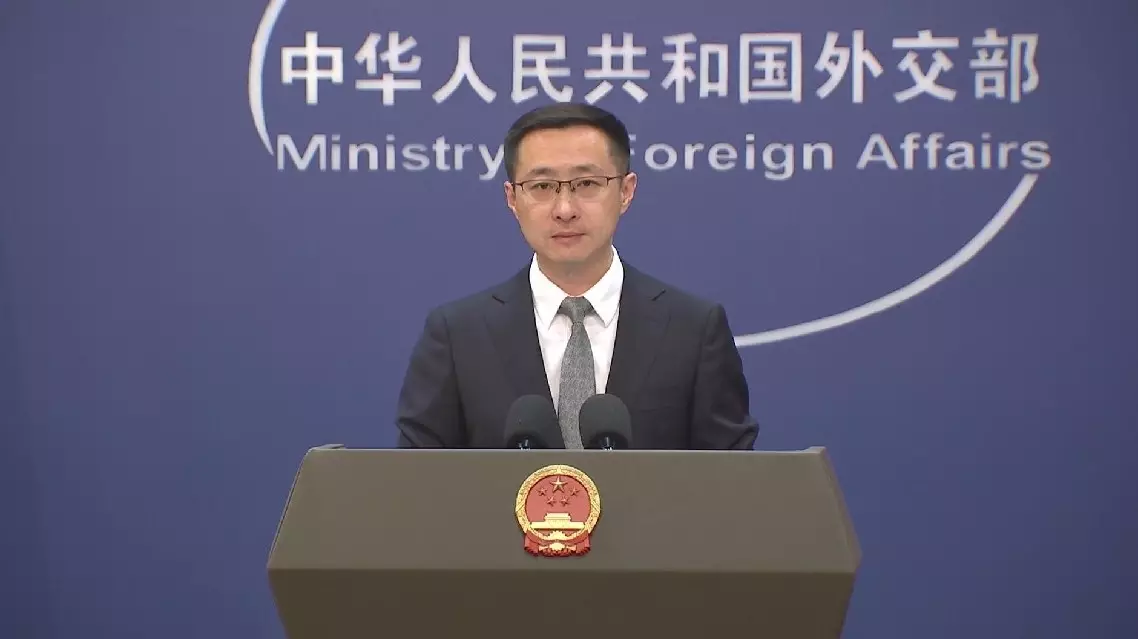China urges the United States to abandon its Cold-War mentality and stop distorting China's strategic intentions, said Chinese Foreign Ministry spokesman Lin Jian on Thursday.
Lin made the remarks at a regular press conference in Beijing when responding to the U.S. Deputy Secretary of State Kurt Campbell's allegation that China has emerged as the biggest challenge in the history of the United States.
"The US official made these remarks to peddle the 'China threat' narrative and advocate bloc confrontation in disregard of facts. They are steeped in Cold-War and zero-sum mentality and ideological bias. China strongly deplores this. The US has viewed the international landscape and identified China-US relations from the perspective of strategic competition, and wrongfully seen China as the 'top challenge.' The US is actually projecting its own hegemonic mentality onto other countries, and making a serious misjudgment on China and the China-US relations. This does not serve the fundamental interests of the two peoples, or meet the extensive aspiration of the international community. China is committed to carrying out friendly cooperation with all countries in the world, and we do not target any third party when developing normal relations with other countries. By contrast, the US has been strengthening its military alliances, patching up small groupings against China, and coercing other countries to choose sides," he said.
"China pursues a defensive national defense policy. We develop finite military capabilities to safeguard national security and we do not target any country. Who is flexing muscles and who is resorting to military means wantonly to solve problems? Facts fully prove that the international community has its fair judgment," Lin noted.
"China urges the US to discard its Cold-War and zero-sum mentality, stop spreading the 'China threat' narrative, stop misinterpreting China’s strategic intentions, act on President Biden’s 'five-noes' commitment, and work with China to uphold mutual respect, peaceful co-existence and win-win cooperation, and promote the steady, sound and sustainable development of China-US relations," he continued.

China urges US to stop spreading "China Threat" theory
Macao has been emerging as a global hub for conventions and exhibitions in recent years by exploring the enormous opportunities in the sector, driving the region to advance its economic diversification and embrace a brighter future.
Macao has received many awards this year, such as the Best Convention City (Asia) and the Best BT-MICE City, showcasing the recognition for and influence of Macao's exhibition industry.
More than 1,000 electronic game enthusiasts from all over the world gathered recently in Macao to participate in a esports themed event.
Su Zhili, organizer of the event, said that Macao's rich experience in hosting large-scale events, coupled with its good infrastructure, has driven him to choose the region as an ideal destination to hold such an activity.
"Macao has held many similar large-scale events. It has rich experience, and the facilities at the venue are relatively mature, so we can start our work comfortably," said Su.
During the first three quarters of 2024, Macao held more than 1,000 conferences and exhibitions in total.
"We will invite more professional, special conferences to be held in Macao and also cultivate more exhibition brands with international influence in Macao, so as to promote Macao's exhibitions to be more market-oriented, professional, international, digital and greener from various aspects. This is our goal," said Elaine Wong, member of the Macao Commerce and Investment Promotion Institute.
In addition, multiple large exhibitions and conferences, such as the Macao International Trade and Investment fair, the Macao Franchise Expo, and the International Infrastructure Investment and Construction Forum, are held regularly in Macao.
With the introduction of a series of policies and measures to facilitate the exchanges between the mainland and Macao, as well as the construction and development of the Guangdong-Hong Kong-Macao Greater Bay Area and the Guangdong-Macao In-Depth Cooperation Zone in Hengqin, Macao's convention and exhibition industry will embrace more opportunities for development in the foreseeable future.
"We have such a good industrial base in the Greater Bay Area. The mode of 'Convention and Exhibition + Industry' not only integrates the industries of Macao, but also the industries of the Greater Bay Area. In addition, Macao actively integrates into the national development and plays a role in the Belt and Road. Why are we so confident in Macao's convention and exhibition sector? Because it is backed by the motherland, and the country gives Macao great support," said Alan Ho, chairman of the Macao Association of Convention, Exhibition and Tourism Sectors.

Macao emerges as global hub for conventions and exhibitions, driving economic diversification and international recognition










